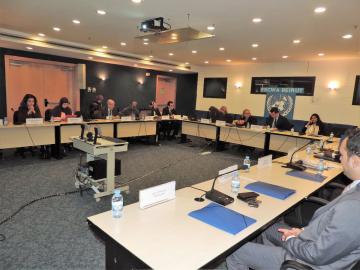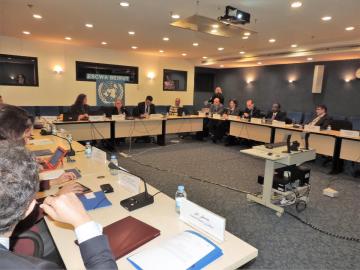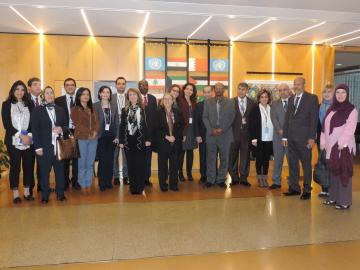Group of Experts on Fossil Fuels, 1st Meeting
05
December
2018
Location:
Beirut, Lebanon
Theme:
Event Type:
Global energy markets have undergone substantial changes in recent years with oil price fluctuations along with the change in population demographics and the downside economic risks that still threaten the energy sector. New patterns of energy demand and supply have also emerged due to the breakthrough in fossil-fuel technologies.
The Arab region is in the midst of a transition from being a major supplier of energy to international world markets towards an increasingly important demand market in its own right. This transition raises considerable challenges but also opportunities for the coming decades.
Although Arab countries exhibit different energy-consumption levels, they all share their reliance on fossil fuels for their domestic energy demand with fossil fuels accounting for around 96% of the region’s own energy needs. The fossil fuels industry is now at a pivotal point in its evolution and we are now on the cusp of a transformation. For the Arab region to achieve the Sustainable Development Goals (SDGs) and implement international agreements, particularly the 2015 Paris Agreement on climate change, it is crucial to move towards advanced, clean energy technologies and develop a more rational use of the region’s fossil fuel resources by boosting their productivity and optimizing their inputs into the energy mix and reduce their impact on climate change.
In order to accelerate collective efforts towards these goals and help member States formulate sustainable energy policies and strategies, the Economic and Social Commission for Western Asia (ESCWA) Committee on Energy (CoE) at its eleventh session in Cairo (May 2017), recommended to ESCWA Secretariat to establish a Group of Experts on Fossil Fuels.
The Arab region is in the midst of a transition from being a major supplier of energy to international world markets towards an increasingly important demand market in its own right. This transition raises considerable challenges but also opportunities for the coming decades.
Although Arab countries exhibit different energy-consumption levels, they all share their reliance on fossil fuels for their domestic energy demand with fossil fuels accounting for around 96% of the region’s own energy needs. The fossil fuels industry is now at a pivotal point in its evolution and we are now on the cusp of a transformation. For the Arab region to achieve the Sustainable Development Goals (SDGs) and implement international agreements, particularly the 2015 Paris Agreement on climate change, it is crucial to move towards advanced, clean energy technologies and develop a more rational use of the region’s fossil fuel resources by boosting their productivity and optimizing their inputs into the energy mix and reduce their impact on climate change.
In order to accelerate collective efforts towards these goals and help member States formulate sustainable energy policies and strategies, the Economic and Social Commission for Western Asia (ESCWA) Committee on Energy (CoE) at its eleventh session in Cairo (May 2017), recommended to ESCWA Secretariat to establish a Group of Experts on Fossil Fuels.
The objective of this first meeting is to establish the “Group of Experts on Fossil Fuels” and formulate its yearly regional program, clearly defining its objectives and activities of short- and long-term priorities of ESCWA member countries and build on issues that have emerged from the energy market on the sustainable production and use of fossil fuels and climate change mitigation.
1- Meeting Details
2- Presentations








